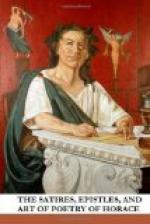Long as the night to him whose love is gone,
Long as the day to slaves that must work on,
Slow as the year to the impatient ward
Who finds a mother’s tutelage too hard,
So long, so slow the moments that prevent
The execution of my high intent,
Of studying truths that rich and poor concern,
Which young and old are lost unless they learn.
Well, if I cannot be a student, yet
There’s good in spelling at the alphabet.
Your eyes will never see like Lynceus’; still
You rub them with an ointment when they’re ill:
You cannot hope for Glyco’s stalwart frame,
Yet you’d avoid the gout that makes you lame.
Some point of moral progress each may gain,
Though to aspire beyond it should prove vain.
Say, is your bosom fevered with the fire
Of sordid avarice or unchecked desire?
Know, there are spells will help you to allay
The pain, and put good part of it away.
You’re bloated by ambition? take advice;
Yon book will ease you if you read it thrice.
Run through the list of faults; whate’er you
be,
Coward, pickthank, spitfire, drunkard, debauchee,
Submit to culture patiently, you’ll find
Her charms can humanize the rudest mind.
To fly from vice is virtue: to be free
From foolishness is wisdom’s first degree.
Think of some ill you feel a real disgrace,
The loss of money or the loss of place;
To keep yourself from these, how keen the strain!
How dire the sweat of body and of brain!
Through tropic heat, o’er rocks and seas you
run
To furthest India, poverty to shun,
Yet scorn the sage who offers you release
From vagrant wishes that disturb your peace.
Take some provincial pugilist, who gains
A paltry cross-way prize for all his pains;
Place on his brow Olympia’s chaplet, earned
Without a struggle, would the gift be spurned?
Gold counts for more than silver, all men hold:
Why doubt that virtue counts for more than gold?
“Seek money first, good friends, and virtue
next,”
Each Janus lectures on the well-worn text;
Lads learn it for their lessons; grey-haired men,
Like schoolboys, drawl the sing-song o’er again.
You lack, say, some six thousand of the rate
The law has settled as a knight’s estate;
Though soul, tongue, morals, credit, all the while
Are yours, you reckon with the rank and file.
But mark those children at their play; they sing,
“Deal fairly, youngster, and we’ll crown
you king.”
Be this your wall of brass, your coat of mail,
A guileless heart, a cheek no crime turns pale.
“Which is the better teacher, tell me, pray,
The law of Roscius, or the children’s lay
That crowns fair dealing, by Camillus trolled,
And manly Curius, in the days of old;
The voice that says, “Make money, money, man;
Well, if so be,—if not, which way you can,”
That from a nearer distance you may gaze
At honest Pupius’ all too moving plays;
Or that which bids you meet with dauntless brow,
The frowns of Fortune, aye, and shows you how?




